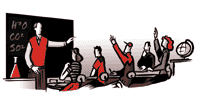
Image: Christoph Hitz
You can still teach Charles Darwin’s theory of evolution in Texas public schools, but if you’re a teacher trying to warn students about the dangers of pollution and global warming, take care. After decades of focusing on hot-button topics like evolution, right-wing activists in the state are taking on a broader set of issues-challenging curriculum materials that warn of an “environmental crisis” or promote such “un-American” concepts as restricting urban sprawl to protect wildlife. Over the past year, conservative groups have challenged dozens of science textbooks, winning the rejection of one widely used text and forcing revisions to several others. This year, with the state board of education slated to consider more than 100 social-science texts, several publishers have invited conservative groups to review their texts in advance — a step that critics say could have ramifications well beyond the Lone Star State. “If Texas continues to make these sorts of decisions, we’re going to see the publishers stop printing these sorts of books,” says Emily Heath of the Center for Commercial-Free Public Education, a California-based nonprofit.
With an annual budget for textbooks of $570 million, Texas “is clearly one of the most dominant states in setting textbook adoption standards,” says Stephen Driesler, executive director of the American Association of Publishers’ school division. “Along with California, it has the biggest in?uence on what gets published.”
At the center of the latest controversy was Massachusetts-based publisher Jones and Bartlett, whose title Environmental Science: Creating a Sustainable Future came under fire from conservative groups such as the Texas Public Policy Foundation, a think tank chaired by Wendy Gramm, the wife of Republican Senator Phil Gramm. Among other things, conservatives objected to a passage according to which “too many people reproducing too quickly” could endanger the planet’s health. In November, the Republican-dominated state board of education voted to reject the textbook; publishers withdrew a dozen other books that had been challenged, and revised several more. In one text, a passage on the lifestyles of Native Americans and European settlers was modified after conservatives criticized its “anti-settler” tone. In another, a reference to carbon dioxide, a greenhouse gas, as a “pollutant” was removed.
As the state board begins another selection round-151 social-science texts are due to be reviewed by November — observers expect controversy over topics such as civil rights and the role of women. (Six years ago, when social-science texts were last reviewed, conservatives objected to books that depicted women as professionals, but not as homemakers.) Neither publishers nor conservative activists would comment on the details of this year’s textbook review; Chris Patterson, education research director of the Texas Public Policy Foundation, says the organization was asked by publishers, including industry giants such as Harcourt and Holt, Rinehart and Winston, to submit comments and agreed to do so, “so that they can have first crack to address some of our concerns.”
One company that won’t be asking the foundation for input is Jones and Bartlett, the publisher of Environmental Science. Associate managing editor Dean DeChambeau says Jones and Bartlett won’t bother to submit science texts in Texas anymore. “There just isn’t the time and resources for us to go through such a process,” he says.












